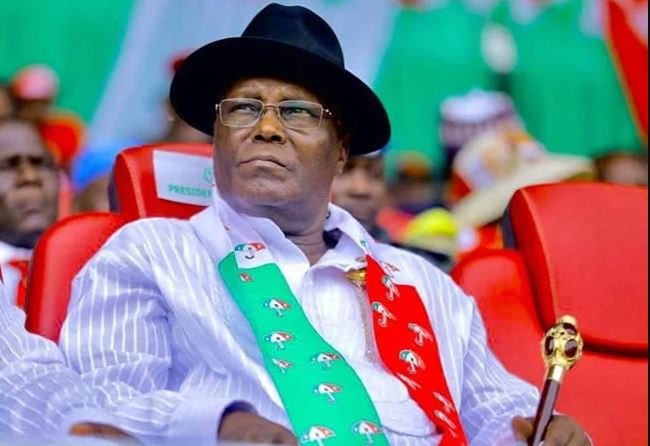Atiku Abubakar, the People’s Democratic Party’s presidential candidate, has lamented that he does not comprehend why the Nigerian army has not yet defeated Boko Haram terrorists.
Goldennewsng reports that during the Sunday episode of Channels TV’s People’s Town Hall 2023 series, he expressed surprise.
Atiku, who appeared alongside his running mate, Senator Ifeanyi Okowa, was asked about his position on Boko Haram and about insecurity.
“I still cannot comprehend why we should have Boko Haram,” he stated. Because I was a Customs officer in Borno State when it was in the north-east and patrolled the entire region, I am very familiar with the vegetation and border areas. In the Borno regions, I still cannot locate a safe haven where anyone can hide from sight. Sincerely, the Boko Haram phenomenon baffles me.
“Sometimes when I came back from Europe, I could see a man walking in Borno State from 30 feet up; therefore, where is the place to hide? to the point where they refer to a location as Sambisa forest. I have experienced it. I didn’t see any trees. There are just scattered shrubs.
As a result, we have sent the Nigerian military, which was once considered to be among the best in the world. They have excelled in a number of international conflicts, and even though we deployed them with all of our might here, we were unable to eliminate Boko Haram. Thus, I am perplexed. I may, therefore, comprehend when I arrive, but I honestly do not comprehend the Boko Haram phenomenon.
“All of it is there. There are politics, business, security, and everything else. Naturally, leadership—strong leadership to deal with all of these interest groups within and outside the military—is the solution.
Okowa responded that if the PDP administration had the right leadership, there would not be a recurrence of militancy in the South-South, when asked about his position on the issue.
He stated, “I believe that it is unlikely that militancy will return once you provide the necessary governance.” You must first inquire as to what caused that. People were left out. Because they were not privy to the infrastructure, people felt excluded from governors. Their children lacked the opportunity for proper education and access to justice.
In addition, Atiku stated that he would negotiate with relevant stakeholders to eliminate subsidies and provide citizens with palliatives.
“I have already announced that we are going to remove subsidies, and then of course negotiate with all stakeholders on how we can establish palliatives for removing subsidies,” he stated.
According to the Petroleum Industry Act, which was passed by the National Assembly, subsidy will have to end by June of next year, regardless of whether we decide to remove it. However, I made the announcement that I would eliminate subsidies prior to the election season.
When I was Vice President, we were supposed to get rid of subsidies in four steps. I oversaw and carried out Phases One and Two while serving as Chairman of the Economic Council. It had been put on hold by the time we reached Phase Three. By the time we left office, there would have been no more subsidies for any government to inherit if we had followed that plan.
Okowa claimed that eliminating subsidies would generate funds for the health and education sectors.
Education and health care are both suffering. The vast majority of Nigerians living in poverty rely heavily on these two areas.
“Furthermore, we must start to free assets to resolve issues of training and to resolve issues of wellbeing so we can give assistance to a greater part of our kin and give schooling to our kids and guarantee that we’re ready to foster each Nigerian so much that they can unreservedly vie for themselves and have the option to deal with themselves,” he said.
Atiku said, “I would direct the Central Bank to stop multiple exchanges so that we close the gap” in response to the question about how he would address the currency shortage.
“Then, of course, and in a second step, how can we also encourage foreign investors to bring in foreign currency?” I believe is very important in relation to that challenge. So basically, if you can do that, you’ll make it as widely available as you can.
“First and foremost, we will ensure that there is only one exchange rate for the majority of industries or factories, not multiple exchange rates as we currently have because the multiple exchange rate regime is corrupted and the individuals who desire foreign exchange consider this to be a very serious issue. It doesn’t matter what role I play; rather, it’s a central bank mechanism.
Atiku made the case that the country’s failing refineries should be privatized.
He stated, “Please, let’s give the four refineries that don’t work to the private sector.” I mean, the private sector is the engine of the economy in every great nation in this country. They take care of everything, including the jobs and prosperity. Why ought we to differ?
Okowa asked the private sector to help build tertiary health institutions while the government focused on primary healthcare in the country’s healthcare system.
He stated, “We are encouraging the subnational governments to ensure that the primary healthcare development service is at its best, while we are encouraging the private sector to develop tertiary health institutions.” Because you’ll find that your people will advance if you can guarantee that primary healthcare centers across the nation provide basic health services.”















